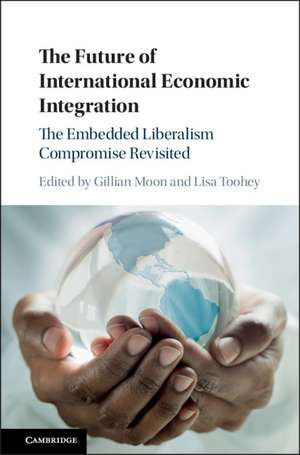The Future of International Economic Integration: The Embedded Liberalism Compromise Revisited
Editat de Gillian Moon, Lisa Tooheyen Limba Engleză Hardback – 26 sep 2018
Preț: 576.92 lei
Preț vechi: 764.10 lei
-24% Nou
Puncte Express: 865
Preț estimativ în valută:
110.40€ • 118.05$ • 92.04£
110.40€ • 118.05$ • 92.04£
Carte indisponibilă temporar
Doresc să fiu notificat când acest titlu va fi disponibil:
Se trimite...
Preluare comenzi: 021 569.72.76
Specificații
ISBN-13: 9781316510179
ISBN-10: 1316510174
Pagini: 266
Ilustrații: 1 table
Dimensiuni: 156 x 235 x 18 mm
Greutate: 0.49 kg
Editura: Cambridge University Press
Colecția Cambridge University Press
Locul publicării:New York, United States
ISBN-10: 1316510174
Pagini: 266
Ilustrații: 1 table
Dimensiuni: 156 x 235 x 18 mm
Greutate: 0.49 kg
Editura: Cambridge University Press
Colecția Cambridge University Press
Locul publicării:New York, United States
Cuprins
Contributor biographies; Foreword Andrew Lang; Preface; List of acronyms; Part I. The Concept of the Embedded Liberalism Compromise: 1. Introduction to the embedded liberalism compromise Gillian Moon and Lisa Toohey; 2. The embedded liberalism compromise in the making of the GATT and Uruguay Round Agreements Meredith Kolsky Lewis; 3. The embedded liberalism compromise as touchstone in times of political turmoil Lisa Toohey; 4. Universal human rights in the embedded liberalism compromise Gillian Moon; 5. Recalibrating the embedded liberalism compromise: 'legitimate expectations' and international economic law Chios Carmody; Part II. The Dynamic of the Embedded Liberalism Compromise: 6. From agriculture to food security: embedded liberalism and stories of regulatory failure Fiona Smith; 7. Embedded liberalism and national treatment: the case of Taiwan's Mijiu taxation Hsu-Hua Chou and Weihuan Zhou; 8. Embedded liberalism and international investment agreements: the future of the right to regulate, with reflections on WTO law Catharine Titi; 9. Regulatory coherence in future free trade agreements and the idea of the embedded liberalism compromise Andrew D. Mitchell and Elizabeth Sheargold; Part III. Engineering the Embedded Liberalism Compromise: Addressing the Future in Times of Turmoil: 10. Embedded liberalism as a framework for description, critique and advocacy: the case of human rights measures under the GATT Rachel Harris; 11. Embedded liberalism and global business: domestic stability versus corporate autonomy? Justine Nolan and Gillian Moon; 12. The embedded liberalism compromise and cultural policy measures. Maintaining cultural diversity alongside WTO law Franziska Sucker; 13. The WTO's purpose, regulatory autonomy and the future of the embedded liberalism compromise Emily Reid.
Recenzii
'This excellent volume does much more than excavate the underlying principles of the post-World War II international trade regime. It also demonstrates precisely how these principles went askew in the most recent wave of globalisation. Most importantly, it addresses how deep reflection on the principles can offer insights into ways of strengthening the fragile 'system' of global economic governance today.' John Gerard Ruggie, Berthold Beitz Professor in Human Rights and International Affairs, John F. Kennedy School of Government, Massachusetts
'This is an excellent set of essays on the continuing vitality of some of the architectural assumptions in the design of modern international economic law. The essays cover numerous issues including trade, investment, food security, cultural sensibilities, human rights, and the workplace.' Steve Charnovitz, George Washington University Law School, Washington DC
'There is a pressing need for sustained and thoughtful discussion about how the international economic system can best serve the interests of a wide range of social and human rights issues and maintain the necessary balance between economic openness and domestic socio-economic stability. This book provides an insightful contribution to that debate in curating the work of some of international economic law's innovative and leading academics, and offers a much needed perspective and way forward for international economic law in testing times.' Gabrielle Marceau, University of Geneva, President of SIEL and Senior Counsellor, WTO Legal Affairs Division
'History is full of ironies; we live in a time when the rule of law and embedded liberalism is under threat from policymakers in two of the countries that designed the longstanding mix of domestic and international trade policies that has kept economic peace and stimulated economic growth. This important edited volume by Professors Gillian Moon and Lisa Toohey rethinks the embedded liberalism concept and reminds us why it deserves both our understanding and support today.' Susan Aaronson, George Washington University, Washington DC, and Senior Fellow, Centre for International Governance Innovation
'This is an excellent set of essays on the continuing vitality of some of the architectural assumptions in the design of modern international economic law. The essays cover numerous issues including trade, investment, food security, cultural sensibilities, human rights, and the workplace.' Steve Charnovitz, George Washington University Law School, Washington DC
'There is a pressing need for sustained and thoughtful discussion about how the international economic system can best serve the interests of a wide range of social and human rights issues and maintain the necessary balance between economic openness and domestic socio-economic stability. This book provides an insightful contribution to that debate in curating the work of some of international economic law's innovative and leading academics, and offers a much needed perspective and way forward for international economic law in testing times.' Gabrielle Marceau, University of Geneva, President of SIEL and Senior Counsellor, WTO Legal Affairs Division
'History is full of ironies; we live in a time when the rule of law and embedded liberalism is under threat from policymakers in two of the countries that designed the longstanding mix of domestic and international trade policies that has kept economic peace and stimulated economic growth. This important edited volume by Professors Gillian Moon and Lisa Toohey rethinks the embedded liberalism concept and reminds us why it deserves both our understanding and support today.' Susan Aaronson, George Washington University, Washington DC, and Senior Fellow, Centre for International Governance Innovation
Descriere
Responds to current world events and offers 'a rich resource for initiating new conversations about potential futures for the trade regime'.
